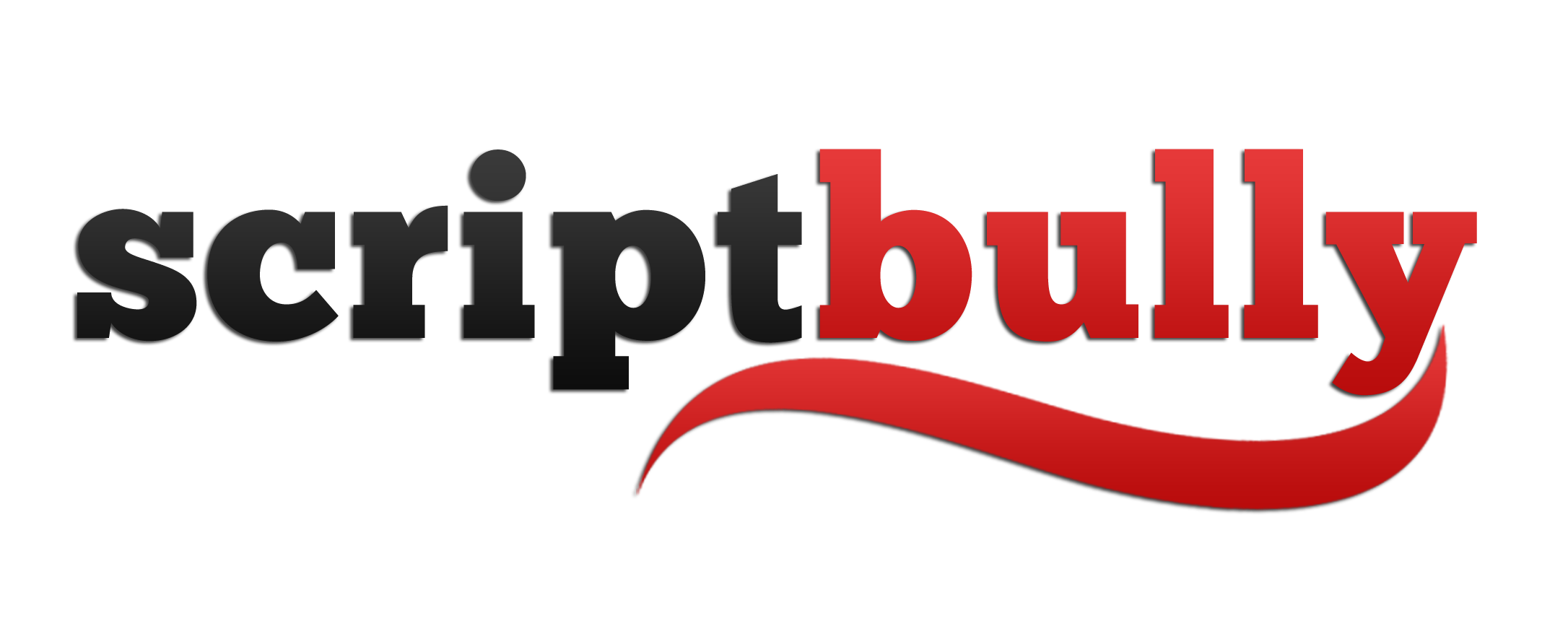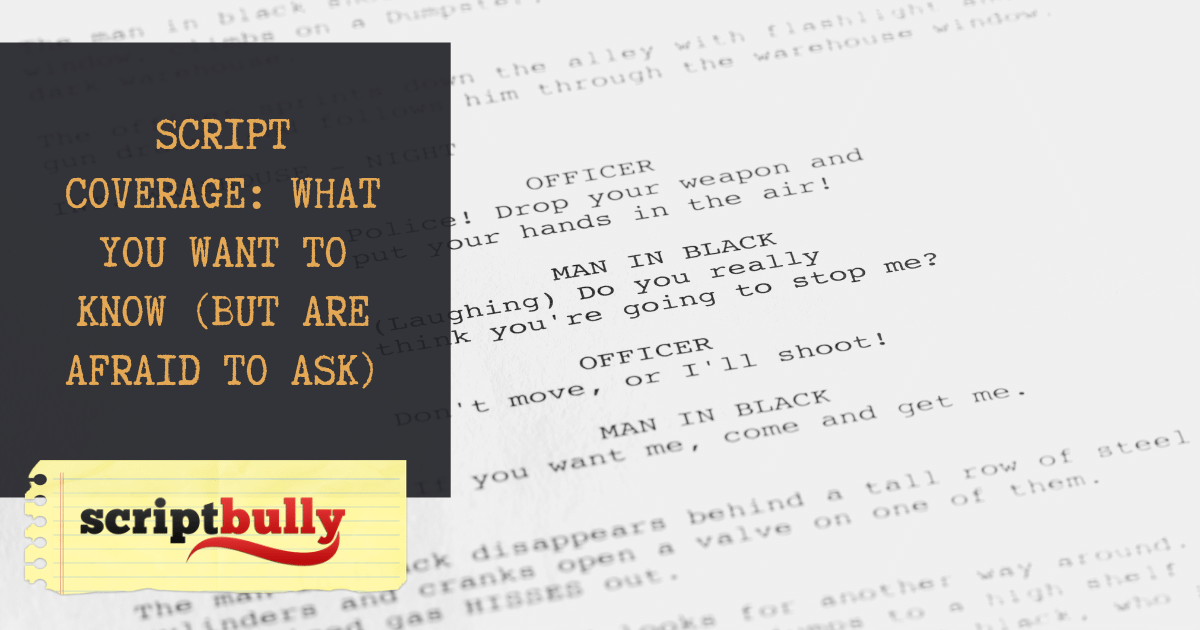Script coverage is the “designated hitter” of the screenwriting craft – everyone has a strong opinion about it. (And nobody can seem to agree.)
Some think it’s a worthwhile and effective system of screenplay analysis to determine the marketability of a script. Others think it’s a needless obstacle to keep novice scripts out of the Hollywood pipeline?
And what the HELL is script coverage anyway? (And what are the different kinds of screenplay coverage anyway?)
So here is a handy-dandy Script Coverage FAQ to help you navigate the murky – if necessary – waters of screenplay coverage:
How Script Coverage (Really) Works
Key Takeaways (Or For Those Who Have ADD):
- Script coverage is a professional evaluation of your script
- It can either be used to filter out crappy scripts or help you get better
- Paying 5k — but it depends — for coverage is not worth it
- Getting coverage (when yer script is ready) can be helpful
FAQ #1: What the HECK is Script Coverage?
Script coverage is a film-industry term to describe the analysis and subsequent evaluation of a screenplay. It is usually executed by the development department of a production company, either independent or attached to studio.
But most agencies, managers – even directors and actors – have somebody on their team who does script coverage.
FAQ #2: Why the Need for Script Coverage?
Because most scripts suck.
Sorry…were you looking for something a bit more polite?
Okay, how about most film-industry folks are exceptionally busy and the best use of their limited resources are not in reading each and every script that comes in.
But, really, it’s about “saving” industry types from reading crappy screenplays.
FAQ #3: Are There Different Kinds of Script Coverage?
There are essentially TWO kinds of screenplay coverage:
1) Traditional script coverage which the film industry uses to vette, filter and grade the mountain of scripts that land on their desk. (Separating the wheat from the badly-formatted chaff.)
And 2) script coverage used in an educational setting. (Where a dedicated screenplay expert/guru provides the writer – for a fee – “professional coverage and notes” that the writer can then use to improve their script and boost its marketability.
The first requires no payment. (Though some unscrupulous characters will try to convince you otherwise.) The second can range anywhere from a couple hundred dollars to $5,000 or more.
FAQ #4: Ouch! Is 5K Screenplay Coverage Worth It?
Depends. Probably not.
If the script ends up selling, or gets you a writing gig, then it’s worth it. (And if it skims 1-2 years off your screenwriting learning curve…then it’s totally worth it.)
Trouble is: we are the worst judge to determine whether our writing is CLOSE to the finish line. (Or miles away.)
We are the worst judge to determine whether our writing is CLOSE to the finish line.
In my experience, a couple hundred bucks is a good amount to spend on coverage to help you take the next step in your screenwriting career. (Without putting you in bankruptcy.)
FAQ #5: What’s in a Typical Piece of Screenplay Coverage?
Usually, it’s broken up into SEVEN key parts: (Though the order can differ depending on who is doing the script coverage.)
- Author Info (this includes who wrote the piece, contact info, genre, etc.)
- Logline (1-sentence summary of the script)
- Summary (this is a 1-2 paragraph summary of the overall analysis of the script)
- Grade or Matrix (usually in the form of Consider, Maybe or Pass – or sometimes seen as Excellent, Fair and Poor)
- Synopsis (2-4 page breakdown of the major events of the script)
- Budget/Marketability (this is optional, but can often be the most important part of the coverage)
- Analysis (the meat of screenplay coverage, where the screenplay’s merits – and failings – are brought to light)
FAQ #6: What’s the Most Important Part of Coverage?
Well, it’s ALL important. But in my experience, I found my BOSSES usually wanted to see the “grade” and “summary” first. (To see if reading the rest is worth their time.) Then they’d dig into the “Analysis” and “Budget.”
But even a “Maybe” or “Fair” isn’t career-destroying. Perhaps the material wasn’t a good fit for them, but they like your talent as a writer. (This is true even for producers.)
But even a “Maybe” or “Fair” isn’t career-destroying.
What can’t be helped is a “poor” or “pass.” This means you are dead to them, and should probably burn their business card.
As for the more consultative coverage, I think it’s ALL key. But funnily enough the synopsis is one part that I think is most instructive. Reading what somebody else THINKS your story is about is often more instructive then particular value judgments about your talent as a screenwriter.
FAQ #7: How Do I Get to See My Script Coverage?
Well that’ll depend on where you send it. Most big agencies and studios keep theirs under lock-and-key. (Trade secrets and all.) But a small boutique agency or producer might send it, if you ask.
Don’t depend on it: this is a tool for THEM not for you.
What you CAN do is ask for the synopsis. Tell them it’ll help your craft as a writer to see HOW an external reader sees the big events of your script.
What you CAN do is ask for the synopsis. Tell them it’ll help your craft as a writer to see HOW an external reader sees the big events of your script.
Sometimes they’ll send that along. (And that can be exceptionally helpful.)
FAQ #8: Who Typically Handles Script Coverage?
Ah, yes, this would be the grunts of the film biz – screenplay readers. An underpaid, overlooked – but important – part of the business.
Generally these are would-be screenwriters, agents, or producers who welcome the abysmal pay for the chance to work in a production company, agency and studio. (Sounds glamorous. Trust me, I did it for years. It’s not.)
FAQ #9: If It’s Handled By Pawns of the Biz, Why Is It So Important?
It’s like the open auditions of American Idol. You’re not trying to win the WHOLE competition…you just want to hear the words: “You’re going to Hollywood.” And in this scenario, getting good coverage and having your script moved up the food chain IS going to Hollywood.
FAQ #10: Yeah, But Why Should I Expect to Get a Fair Read of My Script
Because most screenplay readers don’t want to be one for life. They have bigger film biz fish to fry. And sharing a quality project with your bosses – that eventually gets stars attracted and financing involved – is the quickest way out of indentured servitude.
FAQ #11: Is There Anything I Can Do to Improve the Coverage of My Script?
Ya mean, besides write a damn good script?
Well..first off, you could do your own script analysis of produced screenplays – then do one of your own, and see if it matches up. (Both in terms of page counts and action beats.)
When you’re preparing, imagine one of your cool friends – you know the one who loves movies like you do – is reading your script. Entertain them. Be funny.
Keep the paragraphs short. Get to the point. Make it an enjoyable read. Not just for the person doing script coverage…but everybody.
These things may not guarantee a 200K spec script sale. But they will guarantee you the best shot at possible at a kick-ass screenwriting career.
What’s Your Screenwriter Take?
Have you dabbled into the dark arts of script coverage? How did it go? Was it worth it? Let us know in the comments below.







HI, great article. I’ve often wondered, how does one become a reader? Isn’t it highly competitive? I’m a film student in L.A. I think I’m kind of a slow reader, I wouldn’t want or be able to read more than one script per week…do execs & Producers expect you to read many scripts per week? How much $ per screenplay can a reader expect to be paid?